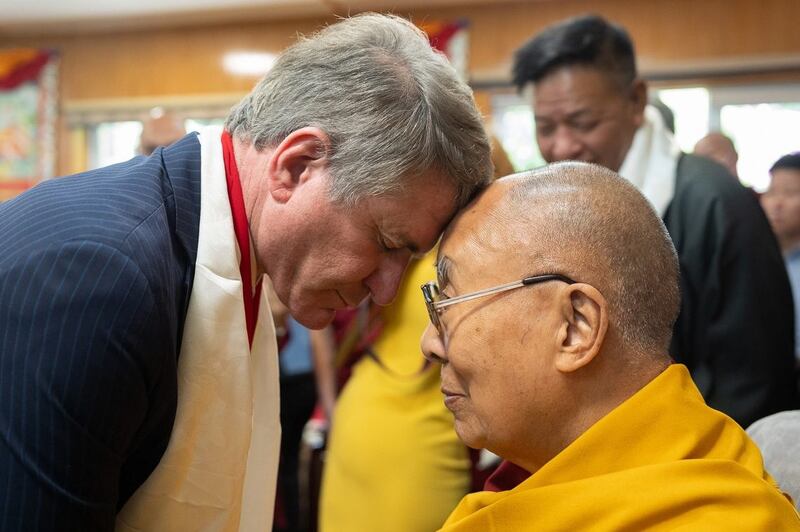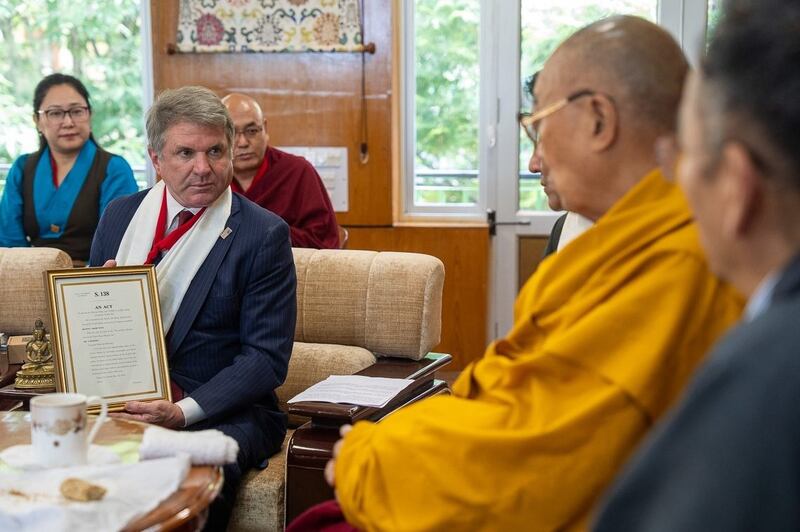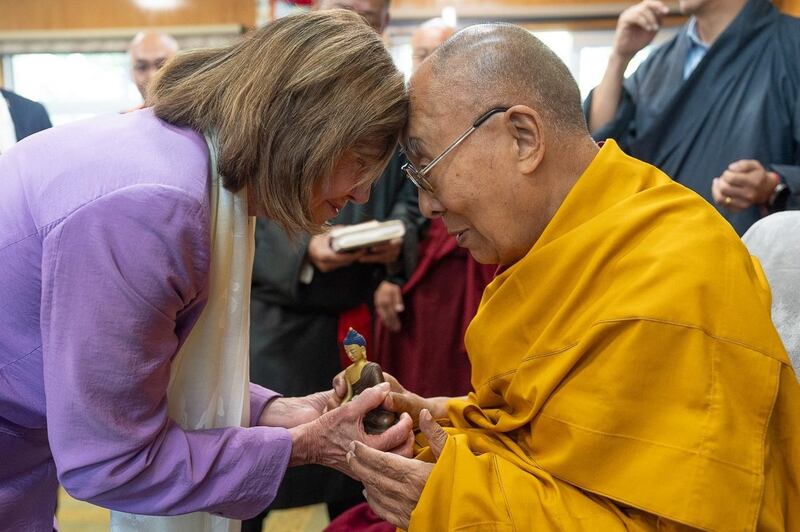Defying a warning from China, a delegation of U.S. lawmakers met with the Dalai Lama in Dharamsala, in northern India, on Wednesday, telling the Tibetan Buddhist spiritual leader that the recent passage of U.S. legislation is a major step toward ensuring the self-determination of the Tibetan people.
Led by Rep. Michael McCaul, a Texas Republican and chair of the House Foreign Affairs Committee, the bipartisan delegation also visited the Central Tibetan Administration, or CTA, the Tibetan government-in-exile, which McCaul called “the temple of democracy.”
Their two-day trip comes a week after Congress passed legislation known as the Resolve Tibet Act urging Beijing to resolve the China-Tibet dispute through dialogue with the Dalai Lama or his representatives – a bill they said President Joe Biden is expected to sign into law in coming days.
The bill “is a major shift in U.S. policy towards Tibet on a road of self-determination,” McCaul told members of the CTA. “The United Nations talks about how every people and every country has a right to self-determination and we believe the people of Tibet have that right as well.”
No formal talks with Beijing on how Tibet should be governed have happened since 2010.

McCaul said he was “so proud of the people of Tibet for having this temple of democracy in exile and I hope that one day this temple of democracy will be back in Tibet itself.”
Upon receiving a framed copy of the U.S. legislation on Tibet, the Dalai Lama thanked the delegation and called the bill “very important.”
Bipartisan delegation
The congressional delegation included former House Speaker Nancy Pelosi; Rep. Gregory Meeks, a Democrat from New York who is his party’s ranking member on the Foreign Affairs Committee; Rep. Jim McGovern, a Democrat from Massachusetts who is also a member of the Congressional-Executive Commission on China.
It also included Rep. Ami Bera, a Democrat from California, Rep. Mariannette Miller-Meeks, an Iowa Republican, and Rep. Nicole Malliotakis, a Republican from New York.
“Our presence here today is also a symbol, a sign to Chinese leaders that America will never ever waver in our support for the Tibetan people,” McGovern told the CTA.
China invaded the independent Himalayan country of Tibet in 1950 and has controlled the territory ever since. The Dalai Lama fled into exile in India amid a failed 1959 uprising against Chinese rule.
Since then, Beijing has sought to legitimize Chinese rule through the suppression of dissent and policies undermining Tibetan culture and language. More recently, China has also sought to control the reincarnation process of Tibetan religious leaders in an attempt to interfere in the selection of the Dalai Lama’s reincarnation.
“The Chinese Communist Party continues to threaten the freedom of the Tibetan people, and they have even attempted to insert themselves into the succession of the Dalai Lama,” McCaul said.
“But we will not let that happen,” he said.
Warning from China
Earlier this week, the delegation received a letter from the Chinese Communist Party warning them not to visit Dharamsala, McCaul said.
“But we did not let the CCP intimidate us, for we are here today,” he said.

Chinese foreign ministry spokesperson Lin Jian on Tuesday criticized the trip.
"We are gravely concerned over the relevant reports and urge the U.S. side to fully recognize the anti-China separatist nature of the Dalai group, honor the commitments the U.S. has made to China on issues related to Xizang, have no contact with the Dalai group in any form, and stop sending the wrong signal to the world," Lin Jian said at a media briefing, using a term that China has started to use to refer to Tibet.
The United States must not sign the bill into law and China will take steps to “firmly defend its sovereignty, security and development interests,” he added.
Beijing believes the Dalai Lama wants to split off the Tibet Autonomous Region and other Tibetan-populated areas in China’s Sichuan, Qinghai, Yunnan, and Gansu provinces from the rest of the country.
However, the Dalai Lama does not advocate for independence but rather proposes what he calls a “Middle Way” that accepts Tibet’s status as a part of China and urges greater cultural and religious freedoms, including strengthened language rights.
“We all are (the) same human being and we all have the same right. And this world belongs to humanity,” he told the delegates at his residence.
“So we should take care of this world, irrespective of what religion or tradition (one belongs to). People of the world should be peaceful, happy,” he said. “That’s our goal.”
Greeted warmly
Upon their arrival Tuesday at Dharamsala’s Gaggal Airport, the delegation was greeted by hundreds of cheering Tibetans who were waving American and Tibetan flags.
Later that day and next, as the delegation visited the Central Tibetan Administration and the Tibet Museum, and participated in a public ceremony organized by the CTA.
“The Tibetan people possess a distinct religion, culture and historic identity and they should have a say in their own future. You should be able to freely practice your religion and that is why we are here today in defiance of CCP’s warning,” McCaul said at the ceremony.
Pelosi, the former House speaker, also underscored the importance of the Resolve Tibet Act.
"We had been fighting for this (bill) for a long time,” she said.

“This bill is a message to the Chinese government that we have clarity in our thinking and our understanding of this issue of the freedom of Tibet," Pelosi said.
The legislation rejects Beijing’s position that Tibet has been part of China since ancient times and calls on Beijing to “cease its propagation of disinformation about the history of Tibet, the Tibetan people, and Tibetan institutions, including that of the Dalai Lama.”
“This message of the U.S. Congress should reach out to other governments,” Sikyong Penpa Tsering, the democratically elected leader of the Central Tibetan Administration.
“I have also spoken with the State Department that once this becomes law then it's incumbent upon them to work with like-minded countries to make sure that similar resolutions or similar statements or similar laws are adopted in other nations,” Tsering added.
Pelosi presented the Dalai Lama with a painting of the dome of the Capitol, which she said should serve as a constant reminder of the many friends he has there.
Additional reporting by Yeshi Dawa, Lobe Socktsang, Dickey Kundol, Tenzin Dhonyoe, Tenzin Lekmon, Dechen Wangmo. Edited by Malcolm Foster.
